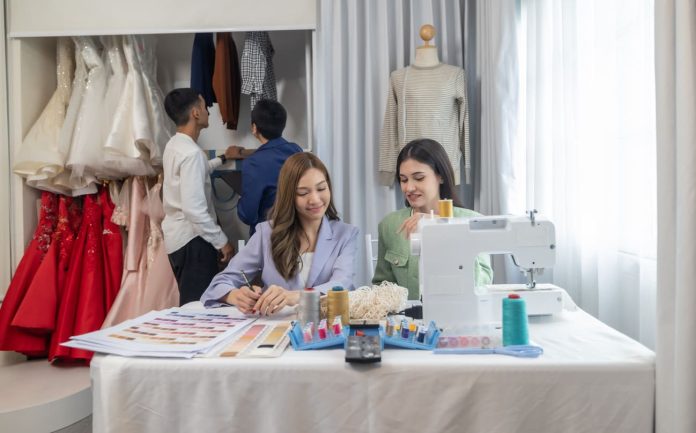By Ann Growl
Fashion education is undergoing a groundbreaking transformation as a collective of innovative educators from India, China, and Russia introduce an immersive approach aimed at instilling a deep understanding of modern fashion ethics within students. This revolutionary initiative was unveiled at the inaugural BRICS+ Fashion Summit, held in Moscow, serving as a platform for launching this forward-thinking educational model. Against the backdrop of industry-wide discussions on diversity, inclusivity, and ethical concerns in the fashion world, this course titled “Globalization in the Fashion Industry: Local Solutions for Creating a Successful Fashion Brand” attracted a select group of applicants eager to engage with a comprehensive curriculum.
Departing from the conventional fashion powerhouses of Paris or Milan, the significance of this multicultural education emerging from Moscow speaks volumes about its relevance and potential impact on shaping the contemporary fashion landscape. While traditional fashion education has traditionally flourished in ideal conditions, thriving within well-developed ecosystems, supported by robust infrastructure, and shaped by the rich experiences of American and European fashion industries, this groundbreaking initiative recognizes that these ideal circumstances do not accurately mirror the global fashion stage. Developed countries are not the sole players in this ever-evolving industry, particularly considering the significant presence of fashion production in developing nations boasting vast consumer bases. The recent rise of China as the largest fashion market, surpassing even the United States, further underscores the importance of educational concepts informed by BRICS nations and hosted by Russia.
Groundbreaking educational course presented at the BRICS+ Fashion Summit drew on the expertise of leading educators from 15 countries, including BRICS member states, Great Britain, Namibia, and the United Arab Emirates. With an illustrious lineup of guest speakers, the curriculum covered a wide range of topics, spanning global fashion trends, identity-driven design principles, ethical production management, and the cutting-edge applications of artificial intelligence in brand promotion.
Practical application formed a key component of the course, as industry practitioners from diverse backgrounds shared their experiences and insights. A number of notable speakers left a lasting impression, such as Luciana Duarte, an ethical fashion consultant from Brazil, who shed light on the transformative use of eco-materials sourced from the Amazon Rainforest in the Brazilian fashion industry. Gregg Maragelis, Head of Institution at Cape Town College of Fashion Design, highlighted the profound influence of cultural heritage on South African fashion, providing students with invaluable perspectives.
Dr. Sanjay Gupta, the Vice President of The Indian World University of Design, and Doreen Mashika, a former luxury goods specialist from Switzerland who founded a brand in Tanzania, emphasized the significance of embracing local identities, honing cross-cultural communication skills, and recognizing unique market opportunities within each region. Li Hibing, the Dean of the School of Fashion Art at the Hubei Institute of Fine Arts, illuminated the indispensable role of 3D technologies in fashion collection creation, as well as the ground-breaking application of artificial intelligence that Chinese designers are already exploring through virtual catwalks.
Bediz Yildirim, a lecturer at the Istanbul Fashion Academy and a former digital content management expert at esteemed publications like Conde Nast and Hearst, provided insights on digital media strategies for increasing awareness of emerging fashion brands. Meanwhile, Olivia Merquior, co-founder of Brazil Immersive Fashion Week, showcased the pivotal role technology plays in optimizing design processes. Oscar Ruiz-Schmidt from the University of Véritas and the University of Costa Rica delved into the environmental challenges faced by the fashion industry, introducing the concept of zero-waste production through examples of traditional attire from various cultures. Finally, the course concluded with a masterclass led by Ajai Singh, founder of Sri Lanka Fashion Week and a member of the board of the Commonwealth Fashion Council, who underscored the importance of diversification for staying relevant and thriving in the contemporary fashion world.
Over a span of five days, participants gained a remarkably global perspective, benefiting from the practical wisdom shared by a distinguished roster of guest educators. Importantly, students were able to adapt these insights to their respective countries, taking into account the unique nuances of creative expression and consumer cultures in diverse nations such as China, India, Brazil, South Africa, Nigeria, and more.
In an era where cultural appropriation and authenticity are increasingly prominent concerns, gaining hands-on insights into a diverse array of cultures is more critical than ever. This avant-garde educational approach, featuring an immersive cultural paradigm, may serve as the blueprint for training future designers who aspire to create ethically conscious brands, drawing inspiration from a broad range of backgrounds.



































